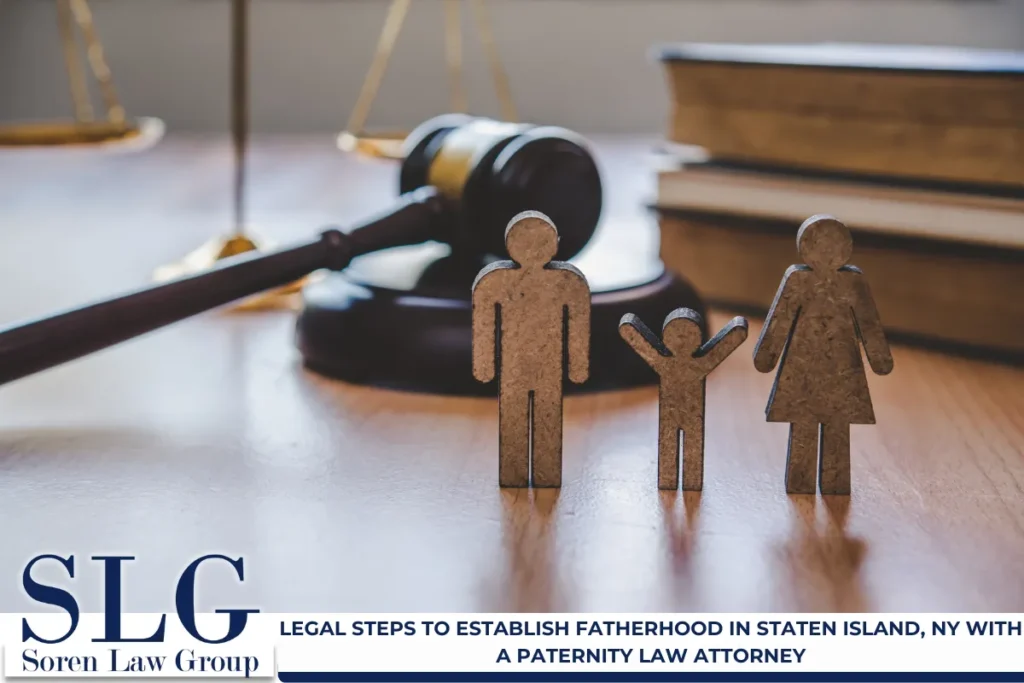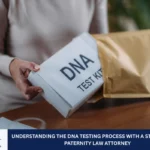If you’re a father in Staten Island, NY looking to understand your legal rights and responsibilities, working with a paternity law attorney can help you navigate the legal system and protect your role in your child’s life. Whether you’re seeking visitation rights, child custody, or child support, knowing how to legally establish fatherhood is the first and most important step under New York law.
In this guide, we’ll walk you through every step of the legal process of establishing paternity in Paternity Cases in New York City, and how a paternity lawyer can provide the legal help you need to become the legal father of your child.
What It Means to Legally Establish Fatherhood
Being a biological father doesn’t automatically make you a legal parent. To get legal custody, visitation rights, and be listed on your child’s birth certificate, the law must recognize you as the legal father. This is where the legal process of establishing paternity comes in.
In Staten Island, there are two main ways to do this:
- Voluntary Acknowledgment of Paternity
- A court order through Family Court
Establishing fatherhood also lets your child qualify for important things like social security benefits, inheritance, and access to your parental health history.
Why You Should Establish Paternity
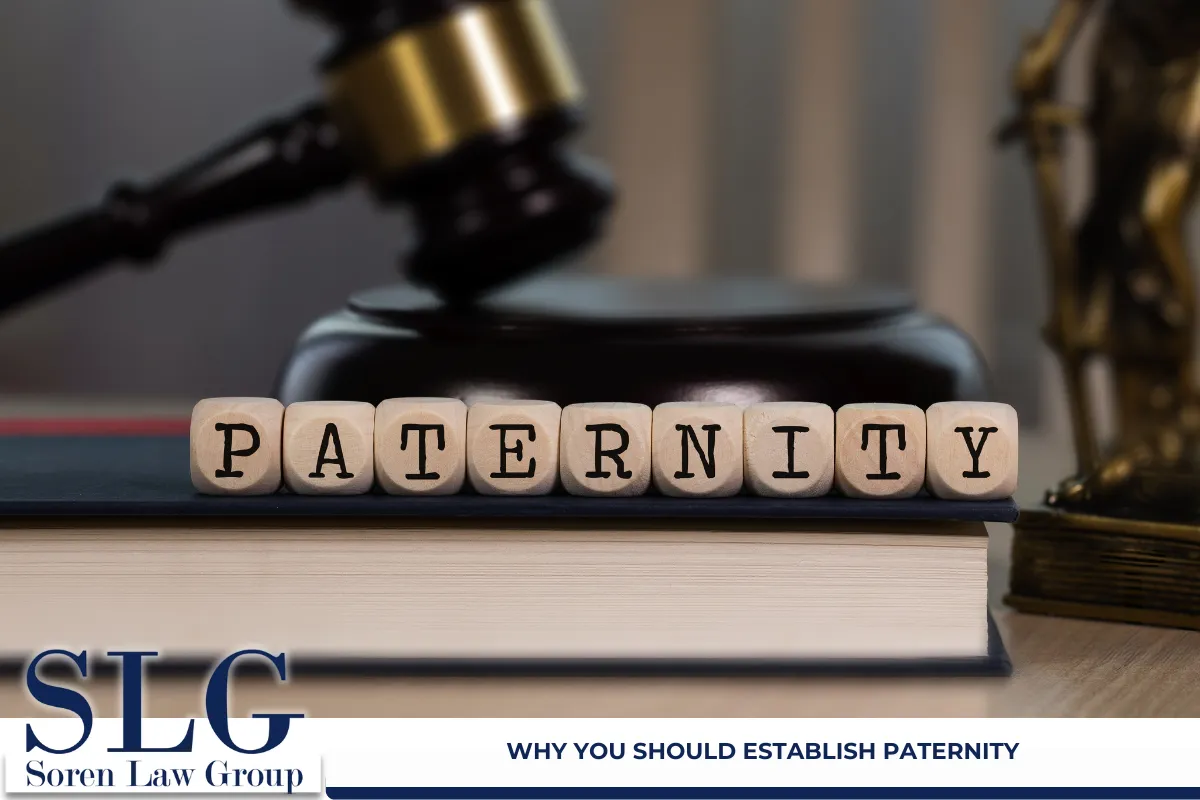
Establishing paternity helps both the father and the child. Here’s how:
- Gives the father legal rights to visitation, custody, and decision-making.
- Helps the child gain access to health insurance, child support, and social services.
- Allows the mother to seek a Support Order through the Office of Child Support Services.
- Benefits the child’s identity and emotional well-being.
Step 1: Voluntary Acknowledgment of Paternity (AOP)
If both parents agree on who the father is, they can sign an Acknowledgment of Paternity (also called Voluntary Acknowledgment of Paternity). This legal document makes the father the legal parent without going to court.
You can sign this form:
- At the hospital when the baby is born
- Later at a Child support office or the Department of Social Services
Important: This is a court-admissible form. Once it’s signed and filed, the father has legal obligations like child support, but also gains parental rights like joint legal custody and the ability to request visitation rights.
Changing Your Mind
If someone wants to cancel the form, they must do so within 60 days or prove there was fraud or duress. After that, it becomes very difficult to undo.
Step 2: Establishing Paternity in Family Court
If either parent disagrees or the father is unsure, they can file a court petition in Staten Island Family Court to start a paternity court case. This is called a Paternity Petition.
The court will:
- Review the case under the Family Court Act
- Order a DNA test (also called a paternity test, genetic test, or blood test) to prove if the man is the biological father
- Issue a court order called an Order of Filiation if the results are positive
Once the DNA Paternity Test proves fatherhood, the court can:
- Add the father’s name to the birth certificate
- Start child support through Child Support Enforcement
- Begin decisions about child custody and visitation rights
Why Hire a Paternity Law Attorney?
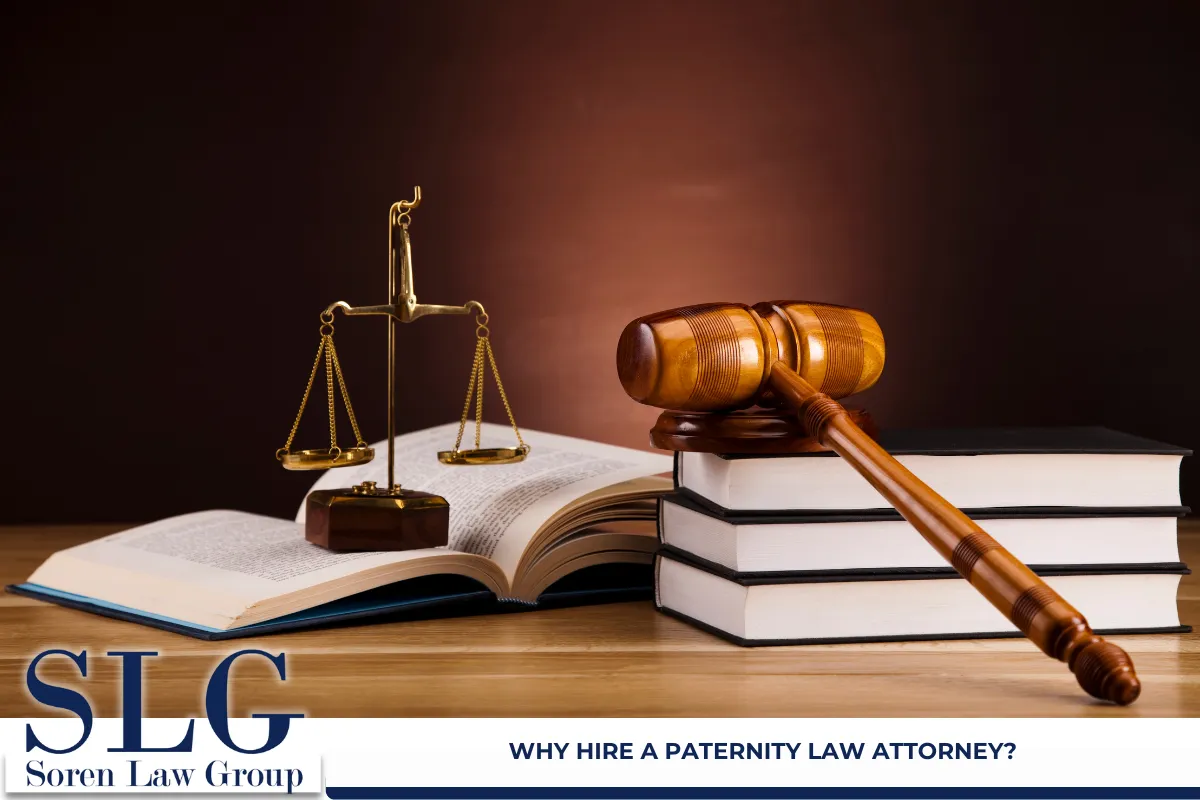
A paternity law attorney understands the family law process in Staten Island and can give you strong legal representation in Family Court or Supreme Court if needed.
They can help you with:
- Filing court paperwork correctly
- Understanding your legal rights and legal obligations
- Protecting your relationship during child custody disputes
- Navigating divorce proceedings or Parental Alienation claims
- Challenging or defending an Acknowledgement of Paternity
Whether you’re going through a divorce or just want parental equality, an attorney ensures your voice is heard and your child’s best interests are protected.
What Happens After Paternity Is Established?
Once you’re legally declared the father, several things can happen:
- You’re eligible to file for legal custody or visitation rights
- A Support Order may be issued based on the Child Support Standards Act
- You can enroll your child in health insurance
- You can provide social security benefits and update legal documents
Common Situations Where Legal Help Is Needed
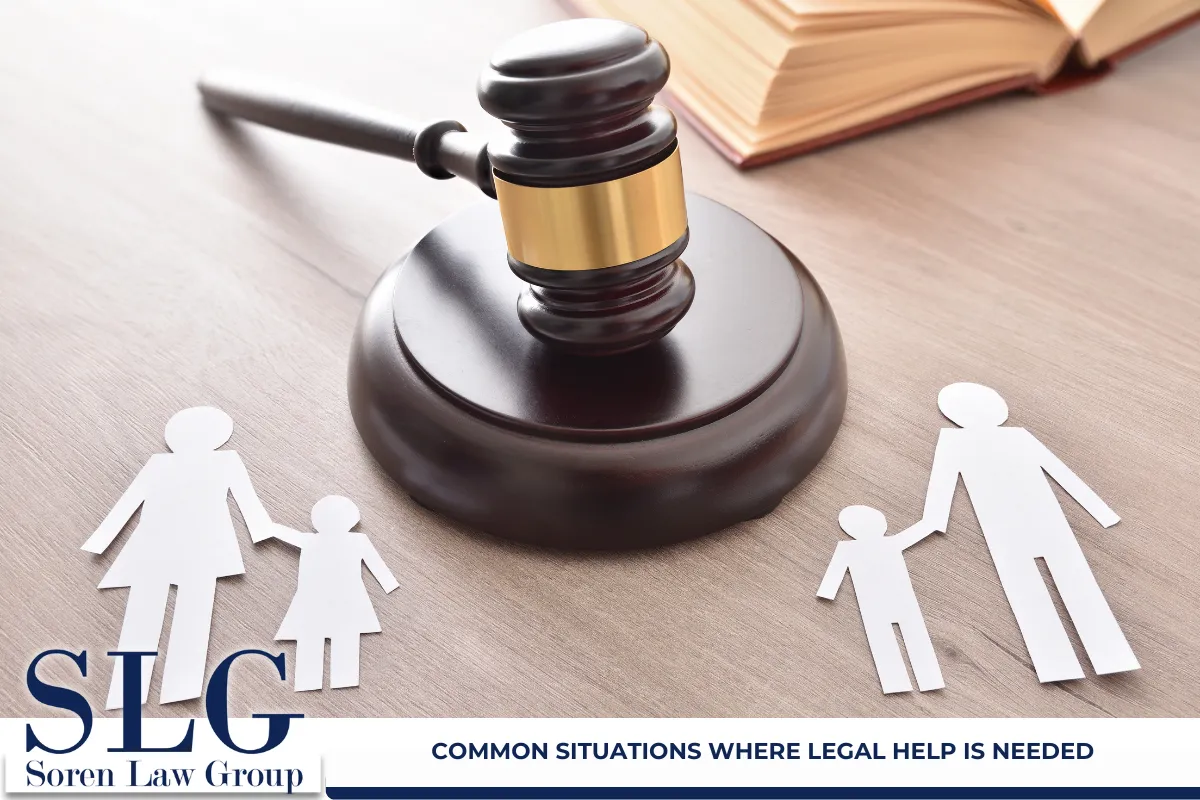
- You suspect you’re not the biological father and want a paternity test
- The mother refuses to let you see your child
- You’re named on an AOP you didn’t knowingly sign
- You’re going through divorce or dealing with Parental Relocation
- You’re trying to amend a birth certificate after a court order
In these cases, getting legal help from a paternity lawyer is critical to protect your parental rights and navigate court proceedings.
Local Resources in Staten Island & New York City
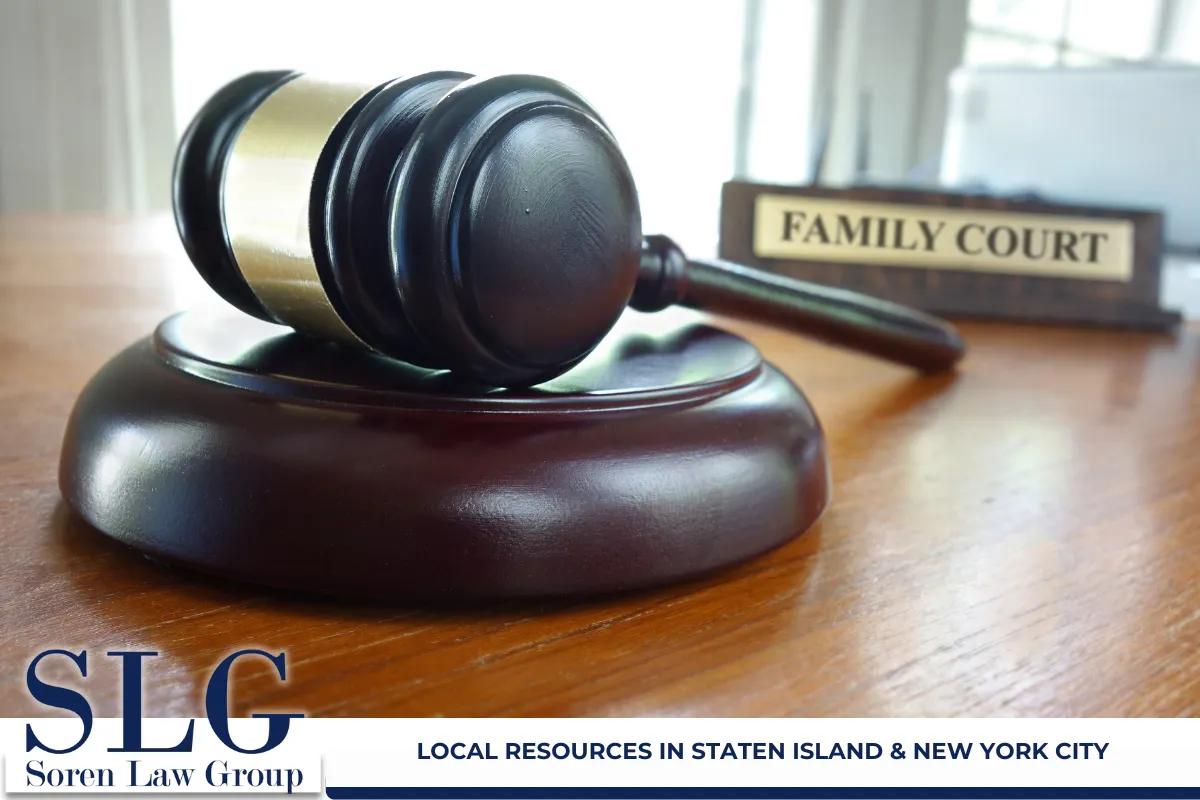
- Staten Island Family Court
- New York City Family Courts
- Office of Child Support Services
- Child Support Enforcement offices
- Department of Social Services – for help with filing paternity forms
Legal aid and Attorney for the Child programs for low-income families
Your Path Forward as a Legal Father
Becoming a legal father isn’t just about a paternity test or a signature—it’s about showing up and taking responsibility. Whether you’re looking to build a parental relationship, share joint legal custody, or provide child support, establishing paternity is the foundation of it all.
If you’re in Staten Island, don’t try to handle everything alone. A skilled paternity lawyer will make sure your case is strong, your paperwork is complete, and your rights—and your child’s—are fully protected in the legal system.
Staten Island Paternity Law Attorney – Soren Law Group
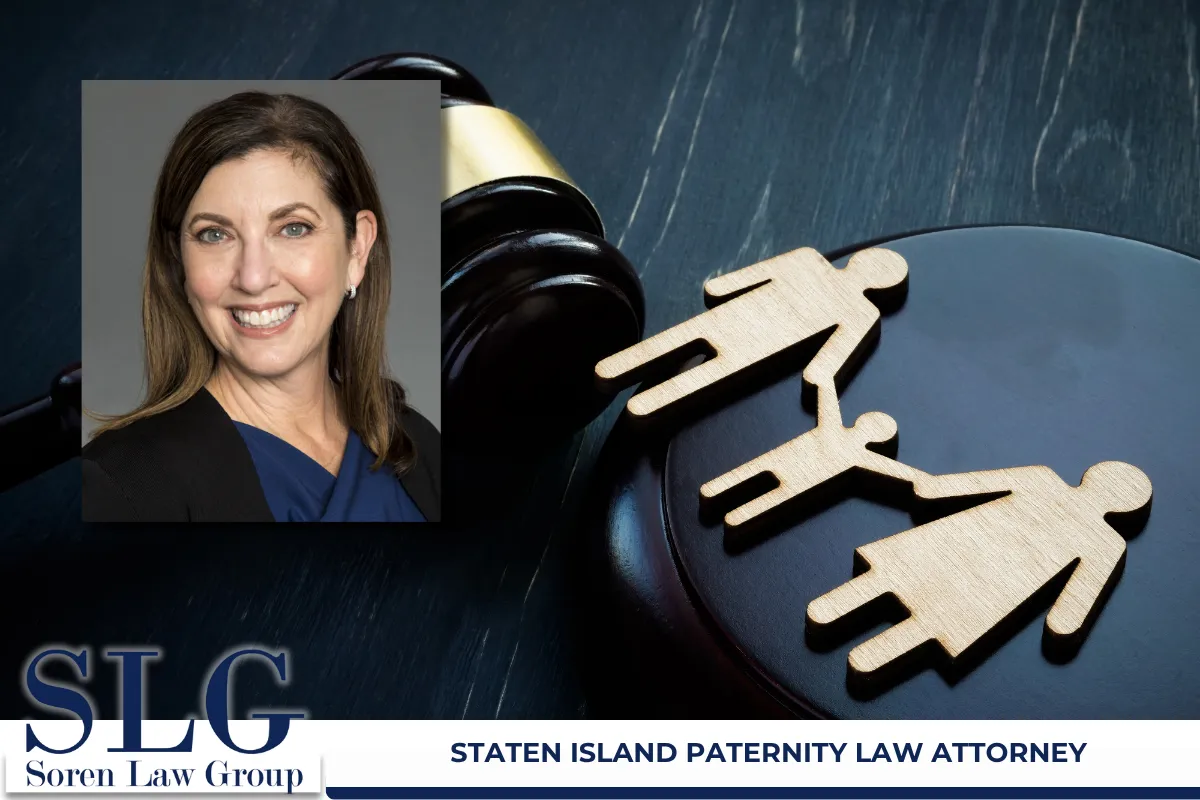
If you’re seeking to establish your parental rights or navigate a complex paternity case, the Soren Law Group is here to help. As a trusted paternity law attorney firm in Staten Island, New York, we provide compassionate, skilled legal representation for fathers and families. Whether you need help with an Acknowledgment of Paternity, DNA testing, or a court petition in Family Court, our team will guide you every step of the way. Don’t face the legal system alone—your child’s future matters. Call us today at (718) 815-4500 or fill out our secure contact form to schedule a confidential consultation. We proudly serve Staten Island and surrounding New York City areas.
FAQ – Understanding Paternity in New York
What is the difference between biological and legal fatherhood?
A biological father is the man whose DNA is shared with the child. This connection is typically proven through genetic testing or Prenatal DNA testing. However, legal fatherhood refers to a man who has legal recognition as a child’s parent, with full child custody rights and child support obligation under Child Custody Laws.
You can become the legal father by:
- Signing an acknowledgment of paternity form (also called a Voluntary Acknowledgement of Paternity)
- Receiving a court order through New York Family Courts
Legal fatherhood gives you the right to make decisions for your child, be involved in a custody arrangement, and be included in child support calculations. It also carries legal duties such as providing financial and emotional support.
Can I establish paternity if the mother refuses to sign anything?
Yes. If the mother refuses to sign the Acknowledgment of Parentage, the father can still establish paternity through the Family court proceedings by filing a petition to the court in New York Family Courts.
Here’s how:
- File a paternity petition to the court
- Appear in Family Court for a child custody hearing
- Undergo legal paternity testing (usually a DNA test)
- If paternity is confirmed, the court issues a court order of paternity
This process protects your rights and lets the court consider the best interests of a child. A family law attorney or child custody lawyer can offer Legal Assistance if the case becomes complex. Even without cooperation from the mother, legal paternity can still be confirmed and enforced through the court system.
How long does it take to get a DNA test and court order in Staten Island?
In Staten Island, the timeline for completing a legal paternity testing process and receiving a court order depends on how busy the New York Family Courts are and whether both parents cooperate.
Typical steps and timelines:
- Filing the petition: 1–2 weeks
- Court scheduling: 4–6 weeks
- DNA sample collection: Done during or after the first hearing
- Results of genetic testing: 2–3 weeks
- Final court decision: 1–2 hearings after results
In total, the process may take anywhere from 8 to 12 weeks. Delays can happen if the mother doesn’t appear in court or if someone disputes the results. With a family law attorney or legal counsel, your case may move faster through Family Court Basics by avoiding paperwork mistakes and ensuring timely appearances.
What happens after an Order of Filiation is granted?
Once an Order of Filiation is issued by a judge in New York Family Courts, the man is legally recognized as the child’s father. This provides a full legal relationship between father and child and carries both legal rights and responsibilities.
Here’s what typically follows:
- The father’s name is added to the child’s birth certificate
- A Child support order may be issued based on child support calculations
- He may file for physical custody or child visitation
- A custody arrangement can be set or modified
Fathers may also gain access to the child’s school and medical records. A child custody lawyer or Staten Island Child Visitation Lawyers can assist with further steps like parenting plans or modification of child custody agreements. The order also allows fathers to be considered in future legal decisions affecting the child’s well-being.
Can a father get custody before paternity is established?
No. Before a father can request child custody rights, he must first establish legal fatherhood through either a signed paternity acknowledgment or a court order. Without legal recognition, he cannot participate in a child custody hearing or make decisions on the child’s behalf.
To gain custody:
- Establish paternity through court or an acknowledgment of paternity form
- Request legal counsel or divorce help if needed
- Petition for legal custody or joint custody
Once paternity is confirmed, the father can seek physical custody, child visitation, and be included in decisions regarding education, health, and more. Child custody lawyers help create strong cases based on the best interests of a child standard.
What if I signed an AOP but now believe I’m not the father?
If you signed an Acknowledgment of Paternity and now doubt your biological connection to the child, act quickly. Under New York law, you have only 60 days from signing the paternity acknowledgement to withdraw it.
After that, you must:
- Petition Family Court to challenge the AOP
- Prove the signing was under fraud, duress, or mistake
- Request a DNA test or legal paternity testing
This is a complex process that requires strong legal strategy and often the help of a family law attorney. The court will weigh the child’s emotional bond and best interests of a child before canceling the AOP. A judge may still keep you as the legal father if the child sees you as a parent, regardless of DNA.
Do I need a lawyer to file a paternity petition?
You are not legally required to hire a lawyer to file a paternity petition, but having Legal Guidance from a family law attorney or divorce lawyer can be extremely helpful, especially in contested cases.
Why legal support helps:
- Avoid errors in forms and Family Court proceedings
- Meet court deadlines
- Prepare for child custody hearings and defend your rights
- Create strong arguments in the best interests of a child
- Understand Family Court Basics and how child support offices work
If your case involves child support, divorce, or custody disputes, Legal counsel becomes even more important. Lawyers also assist with Child Support Modifications, appeals, and challenging old paternity acknowledgement documents.
How does the Putative Father Registry work in NY?
The Putative Father Registry in New York protects the rights of unmarried men who believe they may be the father of a child. If you’re not married to the child’s mother, and she puts the child up for adoption, you may lose your rights unless you register.
Here’s how it works:
- File a notice with the Department of Social Services
- Do this before or soon after the child is born
- If adoption or court actions occur, you’ll be notified
By registering, you can request legal recognition, object to adoption, or file for legal fatherhood. If you delay, the court may finalize actions without your input. A family law attorney can help file correctly and ensure your rights are preserved.
Can a deceased father’s paternity still be legally established?
Yes, it is possible to establish legal fatherhood after a father’s death under certain conditions. This process is often necessary for the child to gain access to social security benefits, inheritance, or other legal entitlements.
To do this, one may:
- File a petition to the court
- Use legal paternity testing through stored DNA or genetic testing of relatives
- Provide evidence such as signed acknowledgment of paternity form or other legal documents
The court considers the evidence and may issue a court order declaring the deceased man as the legal father. Seek Legal Guidance from a family law attorney or divorce attorneys familiar with Family Court Support Services to guide you through this complex but important process.
What legal rights do I get after I’m declared the father?
Once you’re legally declared the father—through either a Voluntary Acknowledgement of Paternity or a court order—you gain full legal rights and responsibilities. These include:
- The right to seek joint legal custody and physical custody
- The right to request child visitation
- The ability to make decisions about health, school, and religion
- The obligation to pay child support under a Child support order
- Rights to be included in modification of child custody decisions
You may also be involved in future Family court proceedings like Child Support Modifications or Parental Relocation hearings. Legal fatherhood also allows you to challenge adoption, access records, and be included in a custody arrangement during divorce proceedings. A child support attorney or divorce help expert can help you assert these rights in New York Family Courts.
Read more What a Staten Island Paternity Law Attorney Can Do for Unmarried Parents

